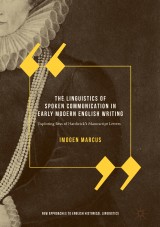Details

The Linguistics of Spoken Communication in Early Modern English Writing
Exploring Bess of Hardwick's Manuscript LettersNew Approaches to English Historical Linguistics
|
96,29 € |
|
| Verlag: | Palgrave Macmillan |
| Format: | |
| Veröffentl.: | 20.11.2017 |
| ISBN/EAN: | 9783319660080 |
| Sprache: | englisch |
Dieses eBook enthält ein Wasserzeichen.
Beschreibungen
This book uses a corpus of manuscript letters from Bess of Hardwick to investigate how linguistic features characteristic of spoken communication function within early modern epistolary prose. Using these letters as a primary data source with reference to other epistolary materials from the early modern period (1500-1750), the author examines them in a unique and systematic way. The book is the first of its kind to combine a replicable scribal profiling technique, used to identify holograph and scribal handwriting within the letters, with innovative analyses of the language they contain. Furthermore, by adopting a discourse-analytic approach to the language and making reference to the socio-historical context of language use, the book provides an alternative perspective to the one often presented in traditional historical accounts of English. This volume will appeal to students and scholars of early modern English and historical linguistics.
<div>Chapter 1: Introduction.- Chapter 2: Early Modern English manuscript letters as data: distinguishing between holograph and scribal writing.- Chapter 3: Prose structure.- Chapter 4: Prose structure in its social context.- Chapter 5: Lexical bundles.- Chapter 6: Vocatives.- Chapter 7: Conclusion.<br></div><p><b></b></p>
<b>Imogen Marcus</b> is Lecturer in English Language at Edge Hill University, UK. She has published on the scribal profiling of early modern English letters, linguistic borrowing from French into English during the Middle English period and the interface between historical semantics and lexicography. She has also participated in the creation of two historical thesauruses.
Provides a fresh perspective on debates surrounding linguistic change in the Early Modern Period Problematizes existing research about the evolution of prose writing and challenges assumptions about the process of standardization in English Takes a discourse-analytic approach to prose structure that takes orality manifested in textual material into account Accounts for the complex nature of historical data sources by considering Bess of Hardwick's use of scribes
<div>Provides a fresh perspective on debates surrounding linguistic change in the Early Modern Period</div><div><br></div><div>Problematizes existing research about the evolution of prose writing and challenges assumptions about the process of standardization in English</div><div><br></div><div>Takes a discourse-analytic approach to prose structure that takes orality manifested in textual material into account</div><div><br></div><div></div>Accounts for the complex nature of historical data sources by considering Bess of Hardwick's use of scribes<div><br></div>
“We have many reasons to be grateful to Imogen Marcus for this thoughtful, well-researched and engaging study of the letters of the socially-aspirant and socially mobile Bess of Hardwick. But above all, Marcus should be praised for her innovation in the area of scribal profiling and the confident ease in which she brings together discourse analysis and palaeography. Her close reading of the distinctive features of Bess’s language and the letter-forms of the numerous scribes who wrote them out – including one that she identifies as Bess herself – is impressive, and the methodology Marcus offers for those studying historical linguistics and palaeography has the potential to be transformative to both fields. That this has not been done before is tribute to Marcus’s wide-ranging expertise and fearless scholarship.” (Stewart J. Brookes, University of Cambridge, UK) <p>“This book brilliantly advances research on the relation between spoken and written language in the Early Modern English period. Its fine-grained analysis of previously unedited data provides a fresh outlook on historical discourse analysis, combined with rigorous philological investigation. Imogen Marcus critically engages with current theoretical models as much as with palaeographic analysis to arrive at innovative results on topics such as sentence boundaries, lexical bundles and vocatives. The book provides a highly readable account that will become a crucial reference in the whole field of studies on Early Modern English.” (Gabriella Mazzon, University of Innsbruck, Austria)</p>

















